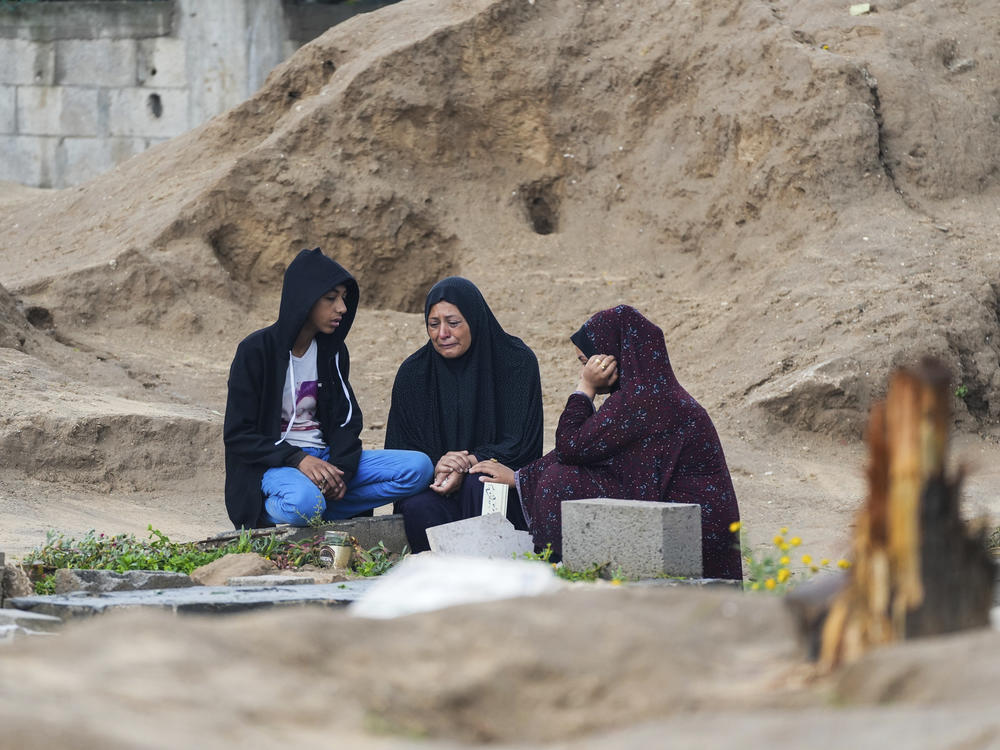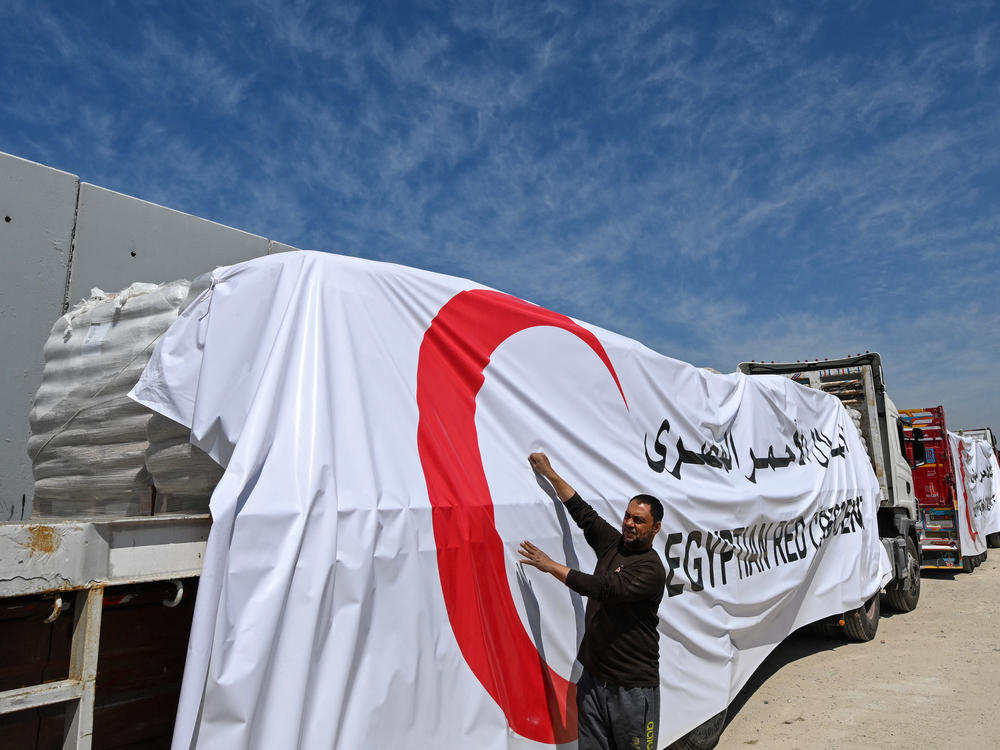Section Branding
Header Content
With little fanfare, Gaza war enters a new stage, from high to low intensity
Primary Content
Fighting in Gaza is down sharply. Aid deliveries are rising rapidly. Israel has withdrawn most of its troops from the ravaged territory.
After six months of the deadliest fighting ever between Israelis and Palestinians, the Gaza war has entered a new stage. The Israel-Hamas war is by no means over, and could drag on indefinitely. Yet months of high-intensity battles have given way to a more limited conflict, according to analysts closely tracking the war.
"We've entered into a very low-intensity phase," said Hussein Ibish with the Arab Gulf States Institute in Washington.
The Israeli military now controls most of Gaza, therefore, he said, "there's not that much more for the full might of the Israeli military to do. As for Hamas, they still can function as a fighting force. But it's a much weaker fighting force than it used to be."
"Both sides need to regroup, consider their positions and try to figure out what to do next," Ibish added.
Neither side has formally acknowledged this change in the tempo of the war. Both Israel and Hamas maintain they're still pursuing the same objectives as when the fighting began.
Israel's Prime Minister Benjamin Netanyahu said again this week that his aim is to destroy Hamas. He added that there's now a date for an Israeli offensive in Rafah, the city at the southern end of Gaza. Rafah is the last Hamas stronghold in the territory, and the place where more than 1 million Palestinians have taken refuge, many in tents.
"This victory requires entering Rafah and eliminating the terrorist battalions there," Netanyahu said. "This will happen. There is a date."
No evidence of an imminent Israeli offensive
Yet the Israeli leader did not provide a date and his statement goes against what's happening on the ground in Gaza.
Israel's military announced Sunday it had withdrawn a division from the southern city of Khan Younis, the main battleground over the past couple months, which is just a few miles from Rafah.
This was the latest in a series of troop drawdowns. Israel isn't providing figures, but military analysts say the Israel Defense Forces, or IDF, have pulled out 90 percent or more of the troops that were in the territory a few months ago.
They say Israel has just one brigade left in Gaza, consisting of a couple thousand troops at most, compared to tens of thousands of forces in the territory at the peak.
As a result, they add, the Israeli military is in no position to launch a major ground operation in Rafah or anywhere else in Gaza at the moment.
Chuck Freilich, a former deputy national security advisor in Israel, believes an Israeli invasion of Rafah could still happen. But it would take weeks of preparations and such a buildup couldn't be disguised.
"Israel would have to conduct a significant call up of the reserves to do so, and that would probably take a couple of weeks," he said. In addition, "it would take certainly a number of weeks to move the Palestinian civilians in Rafah out of that area."
Airstrikes, small-scale fighting still ongoing
The Israeli troops still in Gaza are just inside the eastern edge of the territory, hugging the border with Israel. Others are positioned along a belt that runs across the middle of Gaza. They are dividing the territory into north and south to control the movement of Palestinians.
The vast majority of Palestinians have sought refuge in the southern part of Gaza, and Israel doesn't want to see a large return of civilians — or Hamas militants — to the north.
Israel's scaled-back presence is primarily designed to maintain control, though Israeli troops could also conduct small-scale operations.
Air strikes are still taking place daily, and Israel carried out one high-profile operation Wednesday, hitting a car near Gaza City.
The attack killed three adult sons and four grandsons of a top Hamas leader, Ismail Haniyeh, who lives in exile in Qatar. Israel claimed the three sons were involved in Hamas military operations.
Haniyeh acknowledged the deaths in a statement and said it would not change the Hamas positions in the indirect ceasefire talks with Israel.
"Whoever thinks that by targeting my kids during the negotiation talks, and before a deal is agreed upon, that it will force Hamas to back down on its demands, is delusional," Haniyeh said.
The Palestinian death toll has now topped 33,000, according to Gaza health officials. They say more than 20,000 of the dead were women and children, while the Israeli military says about 13,000 Hamas fighters have been killed. Israel has lost nearly 1,500 civilians and soldiers from the Hamas attack in southern Israel on Oct. 7 and the subsequent fighting in Gaza.
Meanwhile, cease-fire negotiations have been ongoing for weeks, though there's no sign a breakthrough is imminent.
The basic outline is well-known: a six-week ceasefire that would be accompanied by the release of 40 Israeli hostages held by Hamas and hundreds of Palestinian prisoners jailed by Israel.
But the two sides are bogged down over the details. Freilich, the former Israeli security official, said both sides may be reluctant to sign on to a truce right now.
"I think Hamas has an interest to perpetuate this for as long as they can. Things are going quite well from their perspective," said Freilich.
In his view, Hamas wanted to draw the Israeli military into Gaza and now seeks to keep the force bogged down in the territory. The ongoing war creates internal divisions in Israel as the country debates what to do next, and puts international pressure on Israel, while placing the spotlight on the Palestinian cause.
On the Israeli side, "Netanyahu may have a political interest in keeping things going for a while because it prevents early elections from being held," Freilich said.
In Israel, there's an almost universal expectation that elections will be held when the war is over, or perhaps even before it ends. Opinion polls show Netanyahu and right-wing Likud party are unpopular, and therefore would likely be tossed from power if an election is held in the near future.
More aid to Gaza
Meanwhile, aid deliveries to Gaza are up dramatically in recent days.
This follows last week's Israeli air strike that killed seven aid workers from World Central Kitchen, an attack that prompted international outrage. This included a tense phone call between President Biden and Netanyahu. The president told the Israeli leader that the military must stop killing civilians and aid workers and ease the humanitarian crisis.
Over the past three days, more than 400 aid trucks have been entering Gaza daily, according to the Israelis. Over the past six months, the daily figure was often around 100 to 200 a day, with aid groups citing Israeli restrictions as the main problem.
The United Nations and aid organizations say Gaza needs, at minimum, about 500 truckloads of assistance per day. Israel says it's now working to reach that level.
"Our policy has evolved to facilitate more and more aid," Israel's Defense Minister Yoav Gallant said Wednesday. "We plan to flood Gaza with aid and we are expecting to reach 500 trucks per day."
Once the aid reaches Gaza, distributing it to all those in need has been a major challenge. The problem is particularly acute in northern Gaza, where hundreds of thousands of Palestinians remain, but aid groups say it has been difficult and dangerous to operate.
While the level of fighting is down, analysts say a limited conflict could play out for an extended period, and conditions could easily take a turn for the worse.
A formal truce is needed to stabilize Gaza, and even that is no solution if it doesn't address the demands by both sides, which are in many ways contradictory.
Israel wants the return of all the Israeli hostages, it demands an end to Hamas rule of Gaza, and seeks security arrangements that ensure it will never suffer another attack like the one Hamas carried out on Oct. 7.
Hamas, in turn, wants to regain control over all of Gaza, it calls for Israeli troops to withdraw completely, and the group is seeking the release of all Palestinian prisoners. More broadly, Palestinians as a whole are seeking a political horizon leading to statehood.
Without progress on these issues, the analysts say, an end to the current war will leave in place conditions that could lead to the next conflict a few years down the road.
Greg Myre is an NPR national security correspondent who was based in Jerusalem from 2000-2007. Follow him @gregmyre1.
Bottom Content





